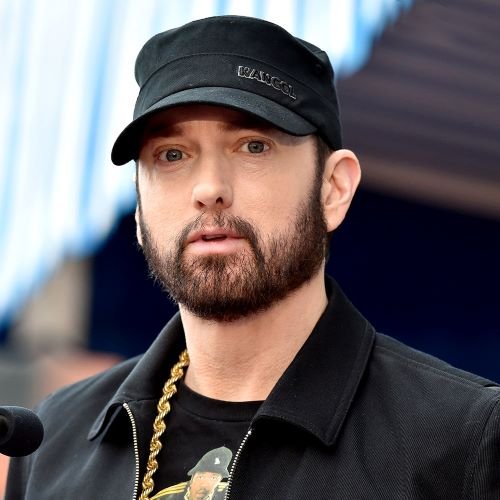FEATURE:
My Name Is…
PHOTO CREDIT: Interscope Records
The Phenomenal Eminem at Fifty: A Career-Spanning Playlist
__________
ON 17th October…
PHOTO CREDIT: Axelle/Bauer-Griffin/FilmMagic
one of the greatest songwriters and rappers of all time turns fifty. Eminem is one of the most gifted voices of his generation. Whilst he is controversial and some of his legacy ahs been dented because of various feuds and legal issues, that can take away from the fact that he is a hugely influential and important artist who deserves acclaim and respect. I am going to end this feature with a career-spanning playlist that joins his best-known tracks and some deeper cuts. There are a couple of articles that I want to bring in before I get there. I recently included an AllMusic biography in an Inspired By… feature about Eminem (a playlist of songs from artists influenced by him). I want to bring in a few sections from that biography that are relevant here:
“The Slim Shady EP opened many doors, the most notable being a contract with Interscope Records. After Eminem came in second at the 1997 Rap Olympics MC Battle in Los Angeles, Interscope head Jimmy Iovine sought him out, giving the EP to Dr. Dre, who proved eager to work with Eminem. They quickly cut Em's Interscope debut in the fall of 1998 -- during which time Marshall reconciled with Kim and married her -- and The Slim Shady LP appeared early in 1999, preceded by the single "My Name Is." Both were instant blockbusters and Eminem became a lightning rod for attention, earning praise and disdain for his violent, satirical fantasias.
Eminem quickly followed The Slim Shady LP with The Marshall Mathers LP in the summer of 2000. By this point, there was little doubt that Eminem was one of the biggest stars in pop music: the album sold almost two million copies within the first two weeks of release, but Mathers felt compelled to tweak other celebrities, provoking pop stars in his lyrics, and Insane Clown Posse's entourage in person, providing endless fodder for the tabloids. This gossip blended with growing criticism about his violent and homophobic lyrics, and under this fire, he reunited his old crew, D-12, releasing an album in 2001, then touring with the group.
During this furor, he had his biggest hit in the form of the moody ballad "Stan." Performed at the Grammys as a duet with Elton John, thereby undercutting some accusations of homophobia, the song helped Eminem to cross over to a middlebrow audience, setting the stage for the ultimate crossover of 2001's 8 Mile. Directed by Curtis Hanson, best known as the Oscar-nominated director of L.A. Confidential, the gritty drama fictionalized Eminem's pre-fame Detroit days and earned considerable praise, culminating in one of his biggest hits with the theme "Lose Yourself," which won Mathers an Oscar.
After all this, he retreated from the spotlight to record his third album, The Eminem Show. Preceded by the single "Without Me," it turned into another huge hit, albeit not quite as strong as its predecessor, and there were some criticisms suggesting that Eminem wasn't expanding his horizons much. Encore, released late in 2004, did reach into more mature territory, notably on the anti-George W. Bush "Mosh," but most of the controversy generated by the album was for behind-the-scenes events: a bus crash followed by canceled dates and a stint in rehab. Rumors of retirement flew, and the 2005 appearance of Curtain Call: The Hits did nothing to dampen them, nor did the turmoil of 2006, a year that saw Mathers remarrying and divorcing Kim within a matter of four months, as well as the shooting death of Proof at a Detroit club.
During all this, Em did some minor studio work, but he soon dropped off the radar completely, retreating to his Detroit home. He popped up here and there, most notably debuting the hip-hop channel Shade 45 for Sirius Satellite Radio in September 2008, but it wasn't until early 2009 that he mounted a comeback with Relapse, an album whose very title alluded to some of Mathers' struggles with prescription drugs, but it also announced that after an extended absence, Slim Shady was back. While not quite a blockbuster, the album went platinum, and Eminem followed it at the end of the year with an expanded version of Relapse (dubbed Relapse: Refill) that added outtakes and new recordings. Recovery, initially titled Relapse 2, was issued in June 2010. The album debuted on top of the Billboard 200 chart, where it remained for five consecutive weeks, while its leadoff single, "Not Afraid," debuted on top of the magazine's Hot 100 singles chart”.
I am keen to get to the playlist, but it is important to discuss Eminem’s legacy. One of the most exciting and original writers and performers in Rap history, he has definitely left his mark on the music world. Wikipedia have an article that tells of the huge legacy of a musical genius (who released the greatest hits compilation, Curtain Call 2, in August):
“Credited for popularizing hip hop to a Middle American audience, Eminem's unprecedented global commercial success and acclaimed works for a white rapper is widely recognized for breaking racial barriers for the acceptance of white rappers in popular music. Rising from rags to riches, Eminem's anger-fueled music represented widespread angst and the reality of American underclass. He has been greatly influential for artists of various genres. Stephen Hill, the then vice president of African American-themed television network BET (Black Entertainment Television), said in 2002:
Eminem gets a pass in the same vein that back during segregation black folks had to be better than average, had to be the best, to be accepted ... he is better than the best. In his own way, he is the best lyricist, alliterator and enunciator out there in hip-hop music. In terms of rapping about the pain that other disenfranchised people feel, there is no one better at their game than Eminem.
In 2002, the BBC said that the perception of Eminem as a "modern-day William Shakespeare" was comparable to the reception of American singer Bob Dylan: "Not since Bob Dylan's heyday in the mid-1960s has an artist's output been subjected to such intense academic scrutiny as an exercise in contemporary soul-searching. US critics point to [Eminem's] vivid portraits of disenfranchised lives – using the stark, direct language of the street – as an accurate reflection of social injustice." In addition, the BBC highlighted that, "Where parents once recoiled in horror [to his music], there now seems a greater willingness to acknowledge a music that is striking such a chord among the American young, angry white underclass."] Dan Ozzi of Vice highlighted that Eminem during the early 2000s was "the one artist high school kids seemed to unanimously connect with.... he represented everything high school years are about: blind rage, misguided rebellion, adolescent frustration. He was like a human middle finger. An X-rated Dennis the Menace for a dial-up modem generation."
Writing for Spin in 2002, rock critic Alan Light compared Eminem to the Beatles' John Lennon:
Eminem is even starting to bear a resemblance to one of those rock icons ... Marshall Mathers is becoming something like this generation's John Lennon ... Lennon and Eminem were both subjects of pickets and protests; they both wrote songs about troubled relationships with their mothers; they both wrote about their strange public lives with their wives; they both wrote about how much they loved their kids. Lennon, of course, was able to find ways to use his voice to advocate for peace rather than just blasting away at litigious family members and various pop stars, but still, few other pop musicians since Lennon have found a way to render their private psychodramas into compelling art as effectively as Eminem.
Regarding his rehearsal with Eminem for the "Stan" duet at the 2001 Grammy Awards, English singer Elton John said, "[When] Eminem made his entrance, I got goose bumps, the likes of which I have not felt since I first saw Jimi Hendrix, Mick Jagger, James Brown and Aretha Franklin. Eminem was that good. I just thought, 'Fuck, this man is amazing.' There are very few performers who can grab you like that the first time — only the greats." John further praised Eminem, saying, "Eminem is a true poet of his time, someone we'll be talking about for decades to come. He tells stories in such a powerful and distinctive way. As a lyricist, he's one of the best ever. Eminem does for his audience what [Bob] Dylan did for his: He writes how he feels. His anger, vulnerability and humor come out."
Concerning the controversy surrounding Eminem due to his transgressive music, American entertainer Madonna had said, "I like the fact that Eminem is brash and angry and politically incorrect ... He's stirring things up, he's provoking a discussion, he's making people's blood boil. He's reflecting what's going on in society right now. That is what art is supposed to do.” American musician Stevie Wonder also said, "Rap to me is a modern blues – a statement of how and where people are at ... I think art is a reflection of our society, and people don't like to confront the realities in society ... But until we really confront the truth, we are going to have a Tupac or Eminem or Biggie Smalls to remind us about it – and thank God. They force people to look at realities in society”.
Ahead of Eminem’s fiftieth birthday on 17th October, I might write another feature. Such a fascinating and talented artist, it is clear he has had his problems and is quite divisive. Whether Marshall Mathers III, Slim Shady, or Eminem, it is time to offer up a salute to…
A mighty talent.


